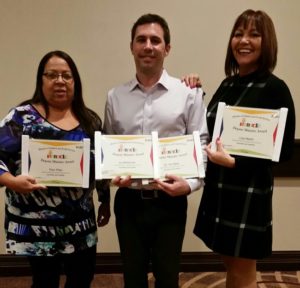The Aboriginal Wholistic Knowledge Sharing Circle recognized with Deputy Minister Pinnacle Award

By Rick Garrick
LONDON—The Aboriginal Wholistic Knowledge Sharing Circle was recently recognized with a Deputy Minister Pinnacle Award from the Ontario Ministry of Children and Youth Services.
“It was in recognition of our creativity and innovation partnership that we have with the Child and Parent Resource [Institute] in London,” says Pam Plain, children youth mental health and addictions counsellor at Southwestern Ontario Aboriginal Health Access Centre (SOAHAC) and Aamjiwnaang First Nation citizen. “We have what is called an Aboriginal Wholistic Knowledge Sharing Circle, which is a holistic assessment for children and youth and their family.”
Plain says the circle includes a traditional healer from SOAHAC and a psychiatrist and social worker from the Child and Parent Resource Institute as well as herself. The circle has been providing services to children and families in the Southwest Ontario Region since 2013.
“We conduct a holistic assessment,” Plain says. “And then I follow-up and do case management with the family and do referrals and family support and counselling for the child and the family.”
Plain says the circle was created after requests were made by the London District Chiefs Council. SOAHAC currently has five sites which are located in London, Owen Sound, Chippewas of the Thames, Windsor, and a satellite site in Moravian Town.
“It helps with children who have not been diagnosed with mental health illnesses,” Plain says. “They can get connected to the services either internally here at SOAHAC or to some of our partner agencies within the London area. We even service families in Owen Sound and we are just now starting to service them in Windsor.”
Plain has been working with some families for up to two years.
“I work at their pace and what it is they are willing to do for themselves and for their children,” Plain says. “Because it doesn’t only provide recommendations for the child, it also provides recommendations for the parents. It’s healing work for the family unit.”
Plain initially worked as an early childhood educator for 17 years before successfully pursuing and obtaining a Bachelor of Social Work degree at Laurentian University and a Masters of Social Work: Aboriginal Field of Study at Wilfrid Laurier University.
“I’ve worked with children my whole life,” Plain says. “I’ve always been a natural helper within my family and my community and it just seemed natural for me to move forward in this direction. Children and youth have always been my passion.”
Plain says the Anishinabek culture and language have always been strong in her family.
“I’ve always been a Pow Wow dancer,” Plain says. “I’ve attended ceremonies for a long time so for me it was natural to take that stream of education rather than taking mainstream, because it is more culturally focused and has a cultural foundation to my field of practice in which I utilize within my counselling skills and abilities.”
After completing her master’s degree in 2012, Plain began studying sandplay therapy, which involves clients doing spontaneous imaginative play in small trays of sand to create scenes or designs that tell their story. She now offers sandplay therapy as part of her practice at the Chippewas of the Thames site.
“So for me it has come full circle from being an early childhood educator because I learned about sandplay and how that is effective in helping children that may have some internal issues that they don’t know how to express themselves,” Plain says. “So through sandplay they are able to express themselves. As talk therapy doesn’t always work for everyone.”


